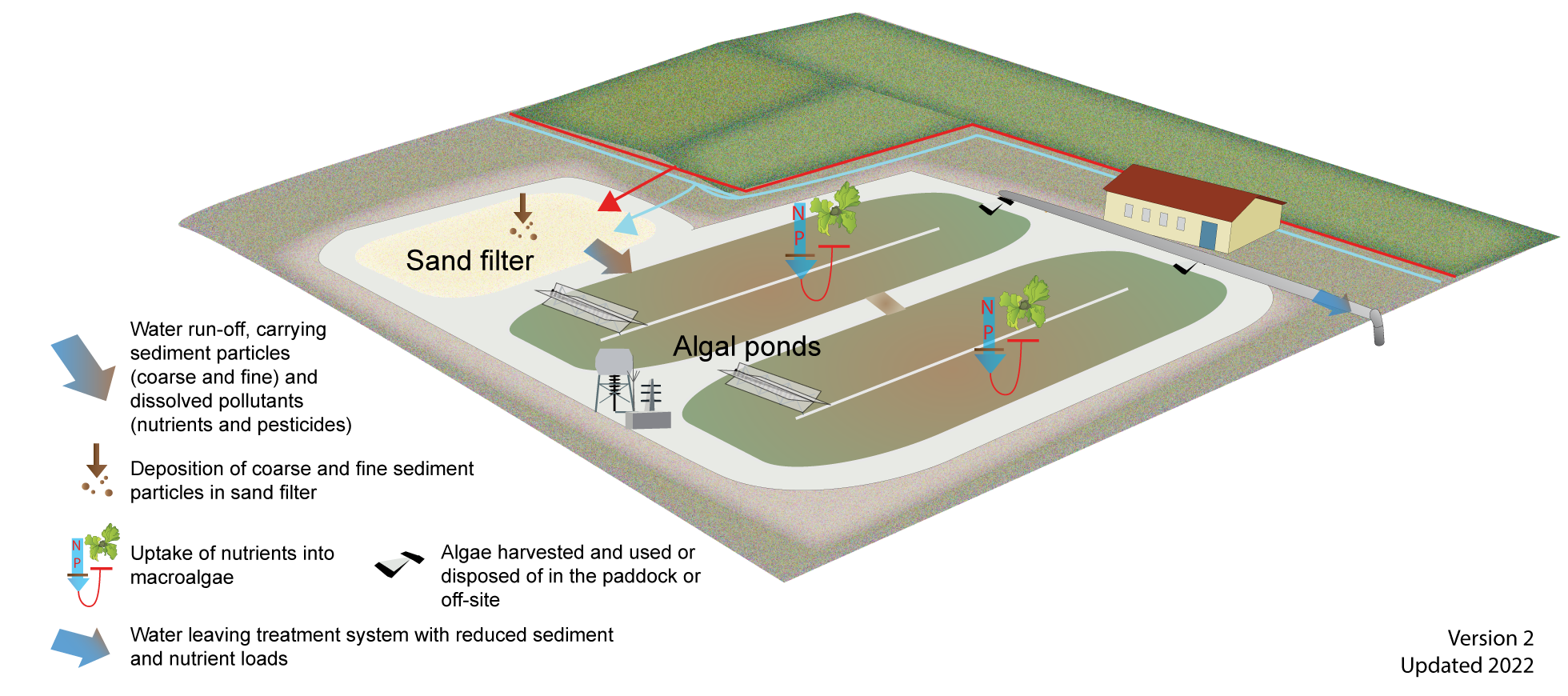|
|
Algae treatmentAlgae treatment — Links and referencesSelect from the tabs below ReferencesAlcántara, C, Muñoz, R. Norvill, ZPlouviez, M, Guieysse, B, 2015, Nitrous oxide emissions from high rate algal ponds treating domestic wastewater, Bioresource Technology 177 (2015) 110–117 Ben Chekroun, K, Sánchez, E,and Baghour, M, 2014, The role of algae in bioremediation of organic pollutants, International Research Journal of Public and Environmental Health Vol.1 (2), pp. 19-32,April 2014 Bolton J.J, Robertson-Andersson, D., Shuuluka, D, and Kandjengo, L, 2009, Growing Ulva (Chlorophyta) in integrated systems as a commercial crop for abalone feed in South Africa: a SWOT analysis, J Appl Phycol (2009) 21:575–583 Cole, AJ, de Nys, R, and Paul NA, 2015, Biorecovery of nutrient waste as protein in freshwater macroalgae, Algal Research 7 (2015) 58–65 Cole, AJ, de Nys, R, and Paul, NA, 2014, Removing Constraints on the Biomass Production of Freshwater Macroalgae by Manipulating Water Exchange to Manage Nutrient Flux. PLoS ONE 9(7): e101284 Cole, Andrew J., Nicolas Neveux, Anna Whelan, Jeff Morton, Mark Vis, Rocky de Nys, Nicholas A. Paul, 2016 Adding value to the treatment of municipal wastewater through the intensive production of freshwater macroalgae, Algal Research, Volume 20, 2016, Pages 100-109 Craggs, R,Sutherland, D, and Campbell, H, 2012, Hectare-scale demonstration of high rate algal ponds for enhanced wastewater treatment and biofuel production, J Appl Phycol (2012) 24:329–337 Craggs, R, Park, J, and Sutherland, D, and Heubeck, S, 2015, Economic construction and operation of hectare-scale wastewater treatment enhanced pond systems, J Appl Phycol (2015) 27:1913–1922 de Nys, Rocky 2018 ‘Bioremediation of wastewater using freshwater macroalgae’ Treatment Systems for water quality improvement - Regional Forum July 2018, Townsville. Lawton RJ, de Nys, R, Paul, NA, 2013, Selecting Reliable and Robust Freshwater Macroalgae for Biomass Applications. PLoS ONE 8(5):e64168 Lawton, R., Mata, L., de Nys, R. and Paul, N.A., 2013, Algal Bioremediation of Waste Waters from Land-Based Aquaculture Using Ulva: Selecting Target Species and Strains. PLoS One 8(10): e77344 Lawton, R, 2015, Reduction of nutrient loads in sugarcane run-off water through algal bioremediation. Report by MACRO — the Centre for Macroalgal Resources and Biotechnology, James Cook University, Queensland Lawson, A, 2016, Bioremediation using freshwater algae. Presentation to the Treatment Systems in Coastal Catchments Forum hosted by the Department of Environment and Heritage Protection, Brisbane, 8 July 2016 Liffman, K, Paterson, DA, Liovic, P, and Bandopadhayay, P, 2013, Comparing the energy efficiency of different high rate algal raceway pond designs using computational fluid dynamics, Chemical Engineering Research and Design 91 (2013) 221–226 Neveux, N, Magnussona, M, Mata, L, Whelan, A, de Nys, R, Paul, NA, 2016, The treatment of municipal wastewater by the macroalga Oedogonium sp. and its potential for the production of biocrude, Algal Research 13 (2016) 284–292 Neveux, N., Nugroho, A.A., Roberts, D.A. M. J. Vucko & R. de Nys 2019 Selecting extraction conditions for the production of liquid biostimulants from the freshwater macroalga Oedogonium intermedium. J Appl Phycol 32, 539–551 (2020). Park, JBK, Craggs, RJ, and Shilton, AN, 2011, Wastewater treatment high rate algal ponds for biofuel production, Bioresource Technology 102 (2011) 35–42 Rai, PK, and Tripathi, BD, 2007, Removal of heavy metals by the nuisance cyanobacteria Microcystis in continuous cultures: an eco-sustainable technology, Environmental Sciences, 4:1, 53-59 Rickert, A, and McShane, T, 2015, Remediation of Agricultural Irrigation Runoff Using High Rate Algal Ponds, A feasibility study, Burdekin-Bowen Integrated Floodplain Management Advisory Committee (BBIFMAC), December 2015 Roberts, DA, Paul, NA, Bird, M.I. and de Nys, R, 2015, Bioremediation for coal-fired power stations using macroalgae, Journal of Environmental Management 153 (2015) 25e32 South Australian Local Government Association, 2020 High rate algal pond (HRAP) design guideline. Government of South Australia, Adelaide, 24pg. Sutherland, DL,& Howard-Williams, C, Turnbull, MH, Broady, PA, and Craggs, RJ, 2014, Seasonal variation in light utilisation, biomass production and nutrient removal by wastewater microalgae in a full-scale high-rate algal pond, J Appl Phycol (2014) 26:1317–1329 Zeraatkar, AK, Ahmadzadeh, H, Talebi, AF, Moheimani, NR, McHenry, MP, 2016, Potential use of algae for heavy metal bioremediation, a critical review, Journal of Environmental Management Volume 181, 1 October 2016, Pages 817-831 Main illustration by Lana Baskerville using IAN symbols library.DisclaimerIn addition to the standard disclaimer located at the bottom of the page, please note the content presented is based on published knowledge of treatment systems. Many of the treatment systems described have not been trialled in different regions or land uses in Queensland. The information will be updated as new trials are conducted and monitored. If you have any additional information on treatment systems or suggestions for additional technologies please contact us using the feedback link at the bottom of this page. Last updated: 10 June 2022 This page should be cited as: Department of Environment, Science and Innovation, Queensland (2022) Algae treatment — Links and references, WetlandInfo website, accessed 8 May 2025. Available at: https://wetlandinfo.des.qld.gov.au/wetlands/management/treatment-systems/for-agriculture/treatment-sys-nav-page/algae-treatment/links-and-references.html |

 — Department of the Environment, Tourism, Science and Innovation
— Department of the Environment, Tourism, Science and Innovation


